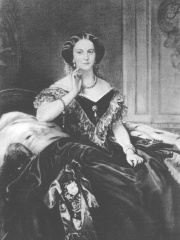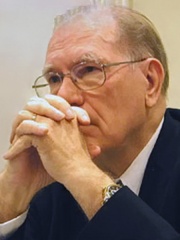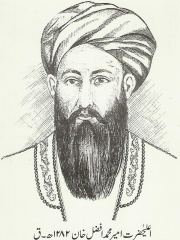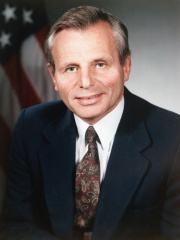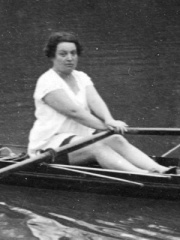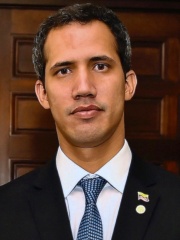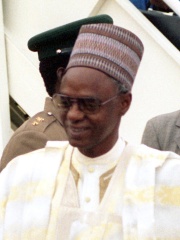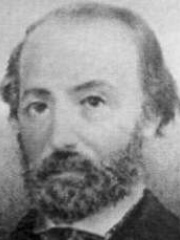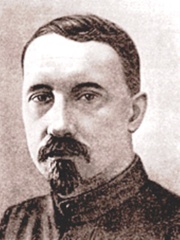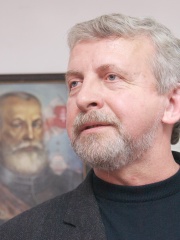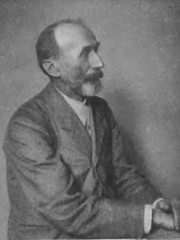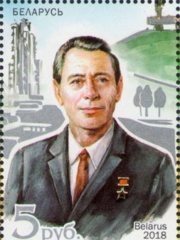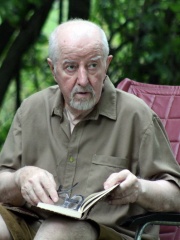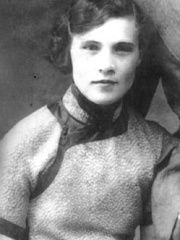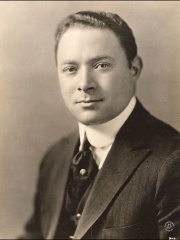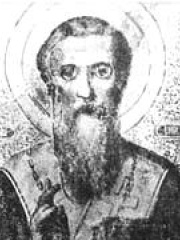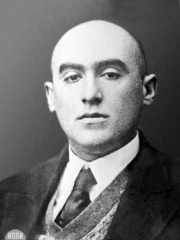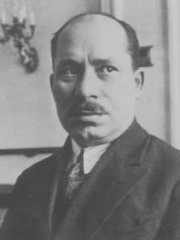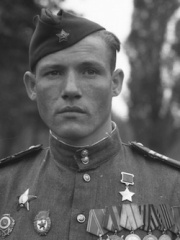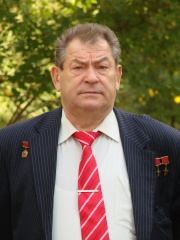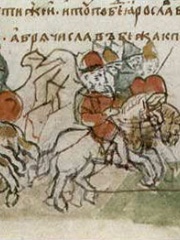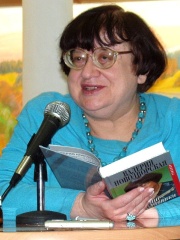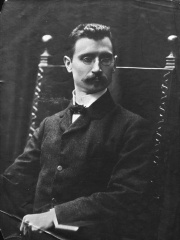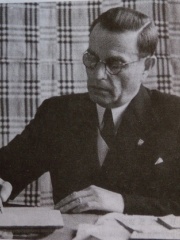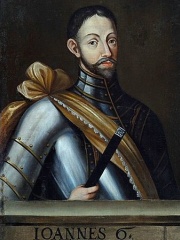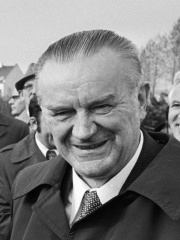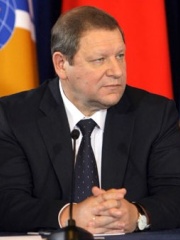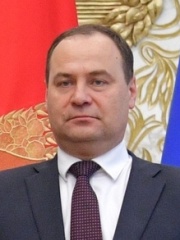Politician
Hayder of Crimea
EN.WIKIPEDIA PAGE VIEWS (PV)
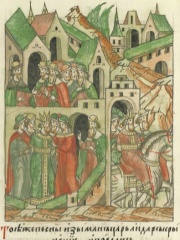
 Hayder of Crimea
Hayder of Crimea
His biography is available in 19 different languages on Wikipedia. Hayder of Crimea is the 13,022nd most popular politician (up from 13,200th in 2024), the 123rd most popular biography from Belarus (up from 135th in 2019) and the 36th most popular Belarusian Politician.
Memorability Metrics
Page views of Hayder of Crimea by language
Among Politicians
Among politicians, Hayder of Crimea ranks 13,022 out of 19,576. Before him are Princess Antoinette of Saxe-Altenburg, Lyndon LaRouche, Mohammad Afzal Khan, Ranulf I of Aquitaine, Frank Carlucci, and Alice Milliat. After him are Juan Guaidó, Shehu Shagari, Quintus Caecilius Metellus Creticus, Lorenzo Batlle y Grau, Æthelheard of Wessex, and Nikolai Podvoisky.
Most Popular Politicians in Wikipedia
Go to all RankingsPrincess Antoinette of Saxe-Altenburg
1838 - 1908
HPI: 58.25
Rank: 13,022
Lyndon LaRouche
1922 - 2019
HPI: 58.25
Rank: 13,023
Mohammad Afzal Khan
1811 - 1867
HPI: 58.25
Rank: 13,024
Ranulf I of Aquitaine
820 - 866
HPI: 58.25
Rank: 13,025
Frank Carlucci
1930 - 2018
HPI: 58.25
Rank: 13,026
Alice Milliat
1884 - 1957
HPI: 58.25
Rank: 13,027
Hayder of Crimea
HPI: 58.25
Rank: 13,028
Juan Guaidó
1983 - Present
HPI: 58.25
Rank: 13,029
Shehu Shagari
1925 - 2018
HPI: 58.25
Rank: 13,030
Quintus Caecilius Metellus Creticus
200 BC - 160 BC
HPI: 58.25
Rank: 13,031
Lorenzo Batlle y Grau
1810 - 1887
HPI: 58.25
Rank: 13,032
Æthelheard of Wessex
750 - 740
HPI: 58.25
Rank: 13,033
Nikolai Podvoisky
1880 - 1948
HPI: 58.25
Rank: 13,034
In Belarus
Among people born in Belarus, Hayder of Crimea ranks 123 out of NaN. Before him are Alaksandar Milinkievič (1947), Kazimierz Alchimowicz (1840), Pyotr Masherov (1918), Ryhor Baradulin (1935), Chiang Fang-liang (1916), and David Sarnoff (1891). After him are Kirill of Turov (1130), Lev Schnirelmann (1905), Alexander Chervyakov (1892), Mikhail Yegorov (1923), Vladimir Kovalyonok (1942), and Bryachislav of Polotsk (997).
Others born in Belarus
Go to all RankingsAlaksandar Milinkievič
POLITICIAN
1947 - Present
HPI: 58.60
Rank: 117
Kazimierz Alchimowicz
PAINTER
1840 - 1916
HPI: 58.56
Rank: 118
Pyotr Masherov
POLITICIAN
1918 - 1980
HPI: 58.50
Rank: 119
Ryhor Baradulin
WRITER
1935 - 2014
HPI: 58.45
Rank: 120
Chiang Fang-liang
POLITICIAN
1916 - 2004
HPI: 58.43
Rank: 121
David Sarnoff
BUSINESSPERSON
1891 - 1971
HPI: 58.27
Rank: 122
Hayder of Crimea
POLITICIAN
HPI: 58.25
Rank: 123
Kirill of Turov
RELIGIOUS FIGURE
1130 - 1182
HPI: 58.16
Rank: 124
Lev Schnirelmann
MATHEMATICIAN
1905 - 1938
HPI: 58.16
Rank: 125
Alexander Chervyakov
POLITICIAN
1892 - 1937
HPI: 58.09
Rank: 126
Mikhail Yegorov
MILITARY PERSONNEL
1923 - 1975
HPI: 58.02
Rank: 127
Vladimir Kovalyonok
ASTRONAUT
1942 - Present
HPI: 58.02
Rank: 128
Bryachislav of Polotsk
POLITICIAN
997 - 1044
HPI: 58.00
Rank: 129
Among Politicians In Belarus
Among politicians born in Belarus, Hayder of Crimea ranks 36. Before him are Valeriya Novodvorskaya (1950), Romuald Traugutt (1826), Radasłaŭ Astroŭski (1887), Alaksandar Milinkievič (1947), Pyotr Masherov (1918), and Chiang Fang-liang (1916). After him are Alexander Chervyakov (1892), Bryachislav of Polotsk (997), Jan Piotr Sapieha (1569), Piotr Jaroszewicz (1909), Sergei Sidorsky (1954), and Roman Golovchenko (1973).
Valeriya Novodvorskaya
1950 - 2014
HPI: 59.02
Rank: 30
Romuald Traugutt
1826 - 1864
HPI: 58.98
Rank: 31
Radasłaŭ Astroŭski
1887 - 1976
HPI: 58.93
Rank: 32
Alaksandar Milinkievič
1947 - Present
HPI: 58.60
Rank: 33
Pyotr Masherov
1918 - 1980
HPI: 58.50
Rank: 34
Chiang Fang-liang
1916 - 2004
HPI: 58.43
Rank: 35
Hayder of Crimea
HPI: 58.25
Rank: 36
Alexander Chervyakov
1892 - 1937
HPI: 58.09
Rank: 37
Bryachislav of Polotsk
997 - 1044
HPI: 58.00
Rank: 38
Jan Piotr Sapieha
1569 - 1611
HPI: 57.94
Rank: 39
Piotr Jaroszewicz
1909 - 1992
HPI: 57.92
Rank: 40
Sergei Sidorsky
1954 - Present
HPI: 57.72
Rank: 41
Roman Golovchenko
1973 - Present
HPI: 57.23
Rank: 42
